Almost everyone is survivor or witness
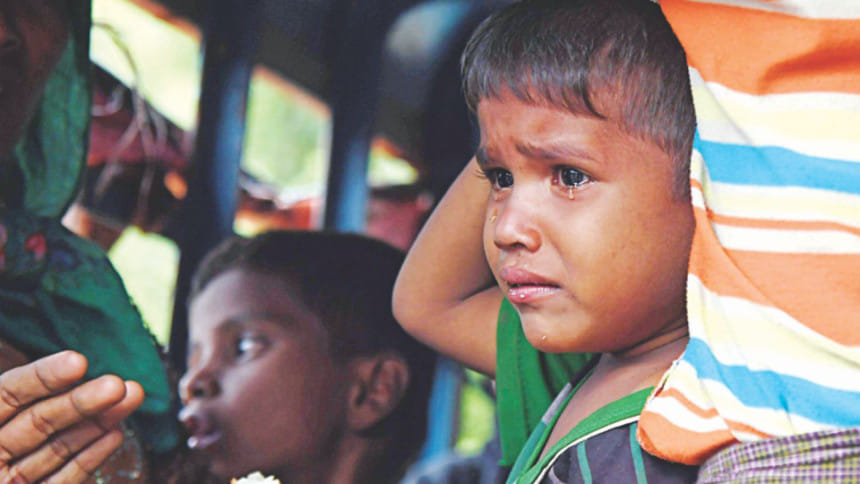
Almost every Rohingya woman and girl, who fled the Rakhine State in Myanmar and took shelter in Bangladesh, is either a survivor of or a witness to multiple incidences of sexual assault, murder through mutilation or burning alive of a close family member or neighbour, said UN Women.
"Women and girls have experienced sexual and gender‑based violence, perpetrated by both the Myanmar army and by Rakhine locals," according to the latest report of UN Women.
The October 2017 report titled "Gender brief on Rohingya Refugee Crisis Response in Bangladesh" published yesterday said many women whose sexual assault resulted in conception were reported to have sought out abortions after arriving in Bangladesh.
UN Women prepared the report with testimonies from community leaders and interviews with refugees in makeshift settlements in Balukhali of Cox's Bazar.
It said 51 percent of the displaced people were women and girls and they live in terrible conditions and lack adequate food, water, sanitation, medical care and access to their livelihoods and assets.
The crisis disproportionately affects women, girls and the most vulnerable and marginalised Rohingya refugee population groups by reinforcing, perpetuating and exacerbating pre-existing, persistent gender inequalities, gender-based violence and discrimination, it said.
This is a frightening reminder that sexual and gender‑based violence are among the most horrific weapons of war, instruments of terror most often used against women, the report said.
The recent influx has more than doubled the population living in refugee settlements and stretched the capacities of humanitarian agencies working to provide emergency shelter, access to clean water and sanitation, healthcare services, delivery of food, nutrition support for malnourished girls and boys, education, and protective services.
Increasing overcrowding and decreasing privacy at all refugee sites elevate safety and security risks, particularly for women and girls, it said.
Almost 400,000 refugees need immediate access to water and sanitation. Due to the increased population, women and men are forced to share toilets without basic protection measures including gender segregation, it said.
Twenty‑four thousand pregnant and lactating women require maternal healthcare support at the already overstretched healthcare facilities.
Many Rohingya refugee households are female headed. Households led by females or elderly people with no male relatives are exhibiting greater vulnerability than those with adult males, the report said.
Having fled extreme circumstances, these households are not only traumatised by the loss of their loved ones, but also the loss of their assets, livelihoods and all forms of financial security.
Women and children are also at heightened risk of becoming victims of human trafficking, sexual abuse or child and forced marriage for the same reasons.
The report said women and adolescent girls between the ages of 13 and 20 newly arriving from Myanmar typically have two to four children each.
SANITATION ISSUE
The lack of toilets and well-maintained manual water pumps have complicated the crisis of Rohingya refugees in Bangladesh, where 30 percent of the 4,370 manual pumps installed were in poor condition and 36 percent of the 24,773 latrines were about to overflow, the United Nations reported Sunday.
"There is continuous new influx of refugees resulting in increase in population at multiple sites which is overloading existing WASH facilities (Water, Sanitation and Hygiene) due to heavy use," said the Inter Sector Coordination Group, which coordinates agencies working in the refugee camps.
The number of refugees who have fled the armed conflict in Myanmar to Bangladesh since August 25 has risen to 607,000, as of October 28. The new influx of refugees brought the number of the ethnic group that sought refuge in Bangladesh to about 819,000.
EU COMMISSIONER IN TOWN
Meanwhile, EU Commissioner for Humanitarian Aid and Crisis Management Christos Stylianides arrived in Dhaka last night for a two-day visit to the Rohingya refugees camps and see their plights.
Christos Stylianides will leave Dhaka this morning for visiting the Kutupalong camp in Cox's Bazar. He will back to Dhaka tomorrow and hold bilateral meeting with Foreign Minister AH Mahmood Ali and will depart Bangladesh.

 For all latest news, follow The Daily Star's Google News channel.
For all latest news, follow The Daily Star's Google News channel. 


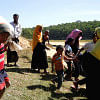
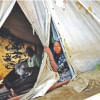
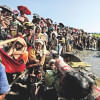

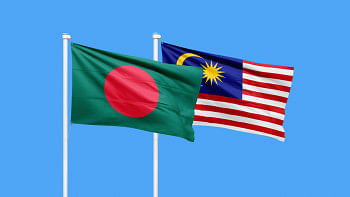
Comments